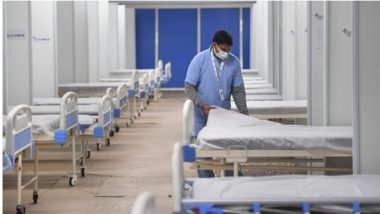New Delhi, October 8: Delhi hospitals are seeing an uptick in patients coming to OPDs with upper respiratory tract infections, typhoid, and gastroenteritis due to the unseasonal rains and weather changes. According to doctors, the number of such cases has nearly doubled owing to an increased awareness about such infections necessitated by the pandemic.
"These days, we are getting more than 20 patients every day in the OPD with complaints of upper respiratory tract infections, undiagnosed prolonged fever, typhoid, cases of swine flu, allergies, pneumonia and dengue,” said Dr Bhagwan Mantri, consultant pulmonologist and critical care specialist at Moolchand Hospital. "Earlier, the number of such patients was less than 10 per day but we are seeing a spike now," he said. COVID-19 MRNA Vaccines Increase Risk of Cardiac-Related Death, Says Florida Surgeon General Dr Joseph Ladapo.
The infections are happening across all age groups but when respiratory tract infections happen among the elderly, they assume a severe form, he added. Expert say that the surge of infectious diseases is generally seen after monsoon every year.
But unlike previous years, some hospitals are also witnessing cases of scrub typhus and leptospirosis in greater numbers. "Dengue which has become a regular burden this season is a regular ailment these days among OPD patients. Besides we are getting typhoid fever, acute gastroenteritis, viral hepatitis, upper respiratory infections, some cases of swine flu, and occasional Covid cases," said Dr Manoj Sharma, Senior Consultant Internal Medicine, Fortis Hospital Vasant Kunj.
"This year we are getting cases of scrub typhus and leptospirosis as well, although numbers are not huge, they are definitely more than previous years," he said. Scrub typhus is an infectious disease caused by Orientia tsutsugamushi, a mite-borne bacterium. Chigger mites, the larval stage of mites, transmit the disease from animals like rats, squirrels, and rabbits to humans.
Leptospirosis is a bacterial infection transmitted through urine or excreta of rats and cattle. According to Dr SCL Gupta, Medical Director, Batra Hospital, the unseasonal rains and the sudden weather change could be a reason behind the spike in the cases.
"Our hospital is seeing cases of upper respiratory tract infections among children, especially among the seven to eight years old. The symptoms include fever, breathlessness, cough, uneasiness," Gupta said. Mantri concurred with Gupta and said that the month of September saw unseasonal rains, which could have been the trigger for this. Typhoid Bacteria Increasingly Resistant to Essential Antibiotics: Lancet.
"Earlier, the illnesses would rear their head in July and August but now with the rains in September, the timing of emergence of these illnesses has also shifted to September," Manti said, adding that when Covid-19 was at its peak, a spike in such cases was not seen. Doctors advise people to wear mask since it not only protects against Covid-19 but other viruses too which get transmitted through air.
"Consult a doctor if you have fever for more than 48 hours. Fever, if not treated well in time, can lead to complications," advised Mantri. The senior doctor also said that thanks to Covid-19, people have started taking respiratory infections seriously. "Whenever people experience breathlessness, they consult a doctor since there is still some fear of Covid. Even physicians refer patients of respiratory illnesses to pulmonologists," he added.
(The above story is verified and authored by Press Trust of India (PTI) staff. PTI, India’s premier news agency, employs more than 400 journalists and 500 stringers to cover almost every district and small town in India.. The views appearing in the above post do not reflect the opinions of LatestLY)













 Quickly
Quickly


